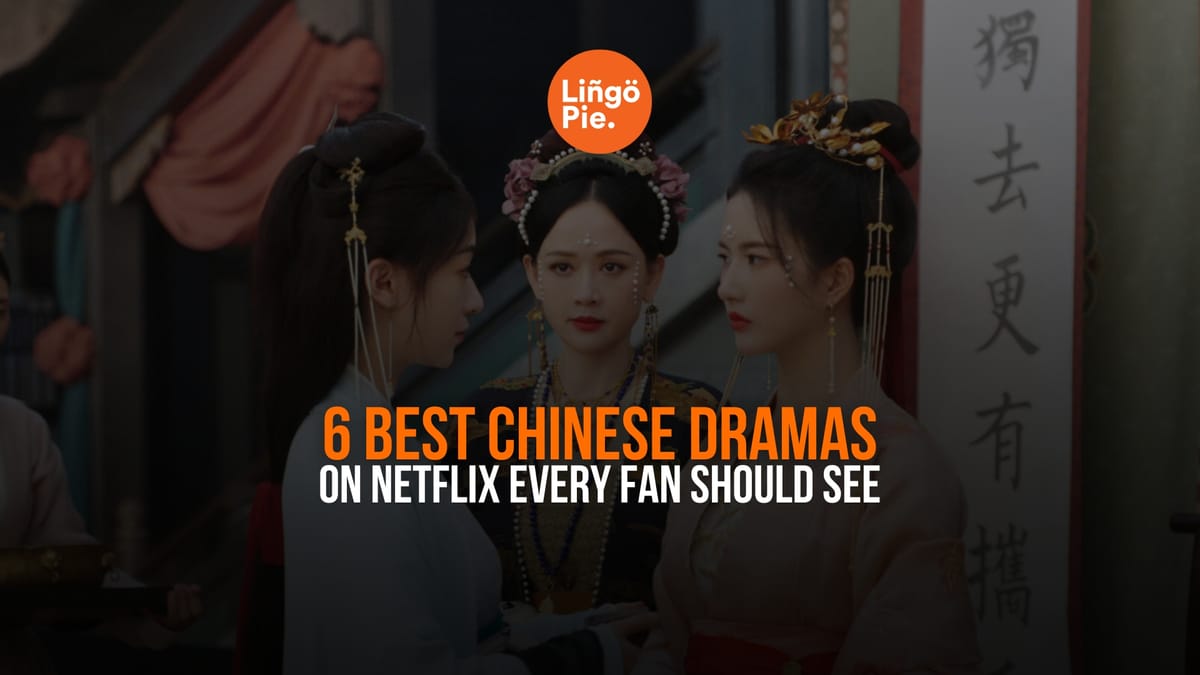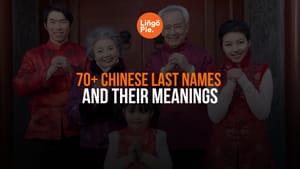Looking for something fresh to stream? Chinese dramas on Netflix remain some of the most underrated shows available right now. While K-dramas and Spanish telenovelas have captured global attention, their Chinese counterparts offer equally captivating stories in Mandarin.
In this post, I'll show you the top 6 C-dramas on Netflix that deserve your immediate attention. Whether you're a language learner hoping to pick up natural Chinese slang expressions or simply someone searching for excellent storytelling, these selections offer the perfect starting point for your Chinese drama journey.

Top Chinese Dramas On Netflix
1. The Double (双生花)

This show follows a woman named Xue Fang Fei who survives being buried alive (scary stuff!) and takes on someone else's identity for revenge. There's fancy costumes, palace drama, and plenty of twists to keep you glued to your screen.
When you're learning Chinese with Lingopie, this show helps you pick up formal language used in historical settings. You'll hear how people from different social ranks speak to each other – super helpful for understanding how respect works in Chinese culture. Plus, those dramatic confrontations make the phrases stick in your memory!
2. Handsome Siblings (俊男坊)

Two twin brothers separated as babies are raised to be enemies: one as a villain, one as a hero. When they finally meet, they have to decide if they'll follow their training or become real brothers. Expect amazing fight scenes and beautiful scenery!
For Chinese learners, the martial arts lingo in this show will definitely expand their vocabulary! With Lingopie, you can learn these specific words used in fighting scenes that you won’t find in textbooks. The characters also speak clearly and dramatically, making it easier to catch what they’re saying even as a beginner.
3. Accidentally in Love (惹上冷殿下)

A rich girl runs away from her wedding and goes to college in disguise. There she meets a famous singer who becomes her deskmate, and they start off hating each other before (you guessed it) falling in love. Meanwhile, she's trying to solve the mystery of her parents' deaths.
This show is perfect for learning everyday Chinese! You'll hear how young people really talk – the slang, the jokes, the ways they express feelings. Use Lingopie to catch those casual phrases you can actually use when chatting with Chinese friends. The modern setting of the show also makes it relevant to conversations you'd have today.
4. Yanxi Palace: Princess Adventures (延禧攻略:骊凰令)

This mini-series (just 6 episodes!) follows Princess Zhaohua as she prepares to marry a prince from Mongolia. Of course, there’s palace drama, beautiful costumes, and romance complications along the way.
Short and sweet, this show is great for focused language learning. You'll hear lots of formal titles and polite speech that’s still important in modern Chinese. The characters speak more slowly and clearly than in modern dramas, giving your ears time to adjust to the sounds of Mandarin.
5. Wave Makers (波浪)

This Taiwanese drama shows what happens behind the scenes in a presidential campaign. It deals with real issues like workplace problems and gender equality without making anyone purely good or bad.
Want to hear how Taiwanese Mandarin sounds? This show is perfect! You’ll notice slight differences in accent and words compared to mainland shows. Lingopie's dual subtitles help you spot professional terms related to politics and work, which is super useful if you’re interested in current events or business Chinese.
6. Meteor Garden (流星花园)

An ordinary girl stands up to a group of rich, popular guys (called F4) at her university. The leader starts off as a total jerk but slowly falls for her determination and kindness. Sounds cliche? Well, it’s a classic story that’s been remade multiple times because people continue to love it so much!
This show is awesome for learning how Chinese changes based on who you're talking to. You'll hear casual talk between friends, formal speech in business settings, and everything in between. With Lingopie, you can practice these different speaking styles that will help you fit in no matter who you're talking with.
Common Chinese Words You'll Hear in C-Dramas
Watching your first Chinese drama? Here are some super common words and phrases you'll definitely hear. Recognizing these will give you those exciting "I understood that!" moments!
Greetings & Basics
- Nǐ hǎo (你好) - "Hello" - The most basic greeting you'll hear in any show
- Wǒ (我) - "I/me" - Characters use this constantly when talking about themselves
- Nǐ (你) - "You" - Used when speaking to one person (informal)
- Nín (您) - "You" (formal) - Used to show respect, especially in historical dramas
- Tā (他/她) - "He/She" - When talking about other characters (写作不同,发音相同)
- Xièxiè (谢谢) - "Thank you" - You'll hear this one all the time!
Drama Favorites
- Āiyā (哎呀) - An expression of surprise or dismay - Characters say this constantly!
- Wǒ ài nǐ (我爱你) - "I love you" - The big romantic moment in any drama
- Duìbùqǐ (对不起) - "Sorry" - For those dramatic apology scenes
- Gōngzhǔ (公主) - "Princess" - You'll hear this a lot in "Yanxi Palace"
- Wáng yé (王爷) - "Prince/Lord" - Another common term in historical shows
Family Terms
- Mā/Mǔqīn (妈/母亲) - "Mom/Mother" - Casual vs. formal ways to say mother
- Bà/Fùqīn (爸/父亲) - "Dad/Father" - Casual vs. formal ways to say father
- Jiějie (姐姐) - "Older sister" - Used for actual sisters or older female friends
- Dìdi (弟弟) - "Younger brother" - Same for younger brothers or male friends
- Tàitai (太太) - "Wife/Mrs." - Especially common in modern dramas
Useful Phrases
- Méi guānxi (没关系) - "It's okay/No problem" - Used to reassure someone
- Zhēn de ma? (真的吗?) - "Really?" - When characters are surprised
- Bù kěnéng! (不可能!) - "Impossible!" - For those dramatic revelation moments
- Zàijiàn (再见) - "Goodbye" - When characters part ways
- Hǎo ba (好吧) - "Okay then/Fine" - Often said with a sigh of resignation
Historical Drama Terms
- Nú/Nupu (奴/奴婢) - "This servant/slave" - How servants refer to themselves
- Huángshang (皇上) - "Emperor" - How people address the emperor
- Niang娘/Gōngzhǔ (公主) - Terms for princesses and imperial women
- Wǎnshàng (晚上) - "Good evening" - Similar to "greetings" in formal settings
- Qiē (切) - An expression of annoyance/dismissal - For those sassy character moments
Keep an ear out for these words, and you'll be amazed how quickly you start recognizing them!
Why Learn Chinese Through Dramas?
Ever tried to learn a language from just textbooks? Boring, right? Chinese dramas make learning this Asian language way more fun and effective! Here's why:
- You hear real conversational Chinese, not just stiff textbook phrases. People in dramas talk like actual Chinese speakers do in everyday life.
- You pick up cultural context along with the language. The way characters address each other, celebrate holidays, or handle conflicts teaches you the “unwritten rules” of Chinese culture.
- The emotional moments in dramas help new words stick in your memory. When a character confesses their love or has a dramatic showdown, those phrases are way more memorable than random vocabulary lists!
Plus, watching episodes in short chunks with Lingopie is perfect for steady progress. Just 20-30 minutes a day adds up fast, and you’ll be too entertained to notice you’re studying!
Ready To Learn Chinese While Having Fun?
These shows make learning Chinese feel like a treat, not a chore! With Lingopie's tools to help you catch new words and phrases as you watch on Netflix, you'll be surprised how quickly your Mandarin improves.
Pick a show that looks fun to you and get started! Whether you're into sword fights, love stories, or modern drama, there's a perfect Chinese show waiting to be your new language teacher. Happy watching and learning!
FAQs About Learning Chinese Through Dramas
Do I need subtitles when I'm starting out?
Absolutely! Start with dual subtitles (Chinese and English) if possible. With Lingopie, you can see both and tap any word you don't know. As you improve, try watching with just Chinese subtitles. The goal isn't to drop subtitles completely right away but to gradually rely less on the English ones.
How do I deal with different accents in Chinese dramas?
Great question! Mainland Chinese shows usually use standard Mandarin (普通话), while Taiwanese dramas have a slightly different accent and sometimes use different words. If you're just starting, stick with one type until you're comfortable. Shows like "The Double" use very standard pronunciation, making them perfect for beginners.
Should I try to learn every new word I hear?
Nope! That's a fast track to feeling overwhelmed. Instead, focus on picking up phrases that come up repeatedly or seem especially useful. With Lingopie, you can save words to review later, so just grab the ones that seem most important for daily conversation or ones related to topics you're interested in.
How long will it take before I understand without subtitles?
Everyone's different, but most learners start catching simple phrases after about 2-3 months of regular watching (30 minutes daily). Don't rush this process! Even advanced learners use subtitles sometimes, especially for historical dramas like "Yanxi Palace" with specialized vocabulary. The important thing is consistent practice.
What should I do when characters speak too fast?
Use Lingopie's replay feature to hear tricky sections again! Most streaming platforms let you slow down playback speed too. Contemporary dramas like "Accidentally in Love" often have faster speech, while historical shows tend to be slower and more deliberate. Start with the slower-paced shows if speed is a challenge for you.




![Telling Time In Korean: A Guide For Total Beginners [2025]](/blog/content/images/2025/04/Telling-Time-in-Korean--3-.jpg)

![Qixi Festival Guide: Meaning, Traditions, and Chinese Love Vocabulary [Guide]](/blog/content/images/size/w300/2025/06/Qixi-Festival-Guide.jpg)


